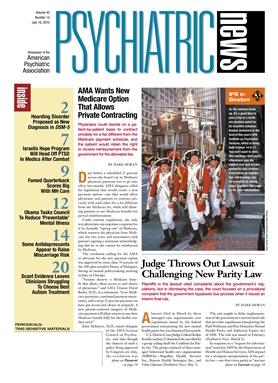Antidepressant use during pregnancy is linked with a heightened risk of miscarriage, a new study suggests. The study was headed by Anick Berard, Ph.D., associate professor and research chair on medications, pregnancy, and lactation in the Faculty of Pharmacy at the University of Montreal. Results were published in the May 31 Canadian Medical Association Journal.
The study cohort consisted of more than 5,000 women in the Quebec Pregnancy Registry who had had a clinically verified miscarriage. Each was matched with 10 controls who were at the same gestational stage as when the miscarriage occurred, so there were more than 50,000 controls.
The researchers compared antidepressant use by the women who had miscarried with that of the control subjects.
Six percent of the women who had miscarried had at least one prescription for an antidepressant filled during pregnancy, compared with 3 percent of the controls. But after potentially confounding variables such as a history of depression or anxiety, sociodemographic characteristics, antidepressant exposure in the year before pregnancy, or use of other medications during pregnancy were considered, miscarriage risk in antidepressant users was determined to be 68 percent greater than in nonusers.
The researchers also examined the increased risk of miscarriage in antidepressant users according to the class of antidepressant used. Again, possibly confounding variables were considered. The risk increased by 27 percent for tricylics, 61 percent for SSRIs, 210 percent for SNRIs, and 351 percent for the combined use of two or more classes of antidepressants.
When the researchers grouped women according to the specific antidepressant they received and compared them with nonusers, paroxetine use alone and venlafaxine use alone were independently associated with an increased risk of miscarriage. The increased risk for the former was 75 percent and for the latter 211 percent.
Finally, the researchers found a significant dose-response relationship between paroxetine and miscarriage risk and between venlafaxine and miscarriage risk: the higher the averagely daily dose of paroxetine or venlafaxine used, the greater the miscarriage risk.
“Overall, it does seem that there is a small, but statistically significant increase in miscarriage with antidepressant use,” Gail Robinson, M.D., a professor of psychiatry and director of the Women's Mental Health Program at the University of Toronto, told Psychiatric News. “[But] there is no information [in the report] as far as I could see about subjects' previous reproductive history, which may increase the risk. It is likewise not clear whether subjects receiving antidepressants actually took them; getting a prescription is not the same. And, most importantly, what is the risk of miscarriage in women with untreated depression? We know that there are a variety of negative outcomes associated with untreated depression in pregnancy, including pre-eclampsia, premature birth, and low birth weight, let alone suicide or attempts to self-abort. So depression itself confers a risk on pregnancy.”
“The bottom line,” Robinson emphasized, “is that there may be a slightly increased risk of miscarriage, but, as with all treatment decisions, we must weigh the risk-benefit ratio and discuss this with the patient.”
Nada Stotland, M.D., a professor of psychiatry, obstetrics, and gynecology at Rush Medical College and a former APA president, also commented on the study for Psychiatric News. “Half of the pregnancies in this country are unplanned. In addition, many are not diagnosed for the first weeks or months. That places clinicians—and patients—in a difficult position with regard to the treatment of a very common and significant disease: depression,” she said. “It would be nice if these findings led to more appropriate [health insurance] coverage of psychotherapy by psychiatrists. They are the health professionals with the medical background to understand such findings and to work with patients who may end up needing antidepressant medications in the physiologically complex context of pregnancy.”
Previous studies have also addressed the possible impact of antidepressants on miscarriage, but findings have been inconsistent. Furthermore, most of these studies had small samples of subjects and therefore lacked statistical power, were biased by confounding factors, or did not examine miscarriage as a primary outcome.
The study was funded by the Quebec Health Research Fund and the Quebec Reserve for Research on the Use of Medications.
